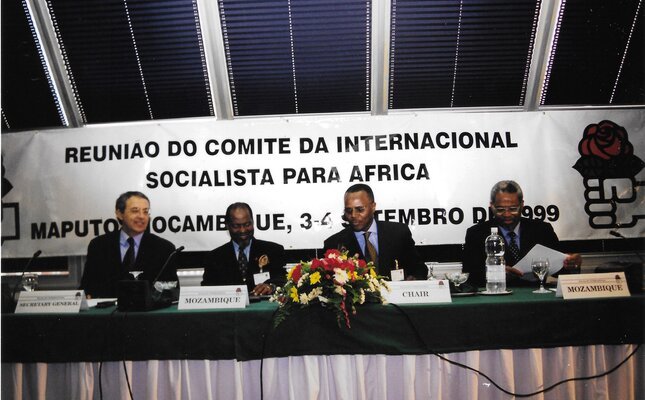Maputo, Mozambique, was the venue for the Africa Committee on 3-4 September, hosted by Frelimo, and chaired by Ousmane Tanor Dieng, Chair of the Committee and Minister of State, Socialist Party, Senegal. The meeting centred on two main themes: 'Advancing the social democratic agenda in Africa' and 'Contributing to the resolution of conflicts in the region'.
Opening the meeting, SI Secretary General Luis Ayala drew inspiration from the positive developments in Mozambique and reaffirmed the commitment of the International to continuing its efforts to reinforce democracy in the region and to voicing more and more strongly the real concerns of Africa through its growing presence on the continent.
Ousmane Tanor Dieng reflected on the challenges of globalisation facing the African continent: "The direction in which the present globalisation process is heading demonstrates that an unfettered market can have perverse effects for the general well-being of nations and humankind in general", he asserted. The Committee had to examine political, economic, social, cultural, regional and local issues in order to fully address the concerns of Africans today, he said.
President Joaquim Chissano welcomed the delegates, stating that the Committee's discussions on peace, democracy, development and globalisation were themes of enormous relevance and of current importance to the lives of African citizens. Mozambique, the President continued, had succeeded in moving forward from difficult periods in its history, and, ahead of the second multiparty elections on 3-4 December of this year, democracy was a truly irreversible process in his country.
Manuel Tomé, General Secretary of Frelimo, introduced the first main theme, outlining the key areas of concern when considering the furthering of social democracy in Africa: the history of the continent; the constitution of nation states; the role of parties in power and those in opposition; and, the freedom of expression and of the press.
As a result of its discussions the Committee issued the 'Maputo Declaration' which addressed the principal concerns for Africa for democracy, peace, development and globalisation. The Declaration took into account the importance of many factors, including that of democracy for socio-economic and cultural development, of strategies for good governance, and of the need for tolerance, freedom of association, information, expression of all citizens and of civil society as a whole, as well as the acceptance of the principle of democratic alternation of power, and for dialogue and tolerance. The Committee reaffirmed its commitment to collective solidarity and encouraged 'the member parties of the Socialist International, both in Africa and elsewhere in the world, to adopt policies aimed at alleviating the problems of their peoples so that they may develop their potential in a peaceful environment and in which institutions work properly'.
The Declaration expressed its deep concern at the situation of armed conflicts taking place on the African continent and lent its solidarity to 'all the peoples of Africa who are currently denied the opportunity to live in peace', adding that 'the international community must assume its responsibility to promote and safeguard a culture of peace'. The Committee appealed to all its members to promote concrete actions and proposals to further integration in the region and undertook to continue its initiatives to prevent conflicts, to support its members suffering the consequences and to send missions aimed at contributing to their peaceful resolution.
The Committee closely examined the constraints that hinder development in Africa, noting that 'globalisation is an irreversible and unavoidable process which we must all be prepared for... African governments need to acquire the skills to keep up with the pace of development and the advent of globalisation'. Due to the widespread competition between multinationals, it was felt that Africa had remained on the sidelines of development. Therefore, the Committee made a number of recommendations which included creating conditions for agreements between governments and influential social groups, promoting quality services for healthcare and education to prevent AIDS and so protect the human resources of the countries in the region. In terms of economic stimulus, internal and external capital investments should be promoted, and policies combatting poverty and destitution should be prioritised. Furthermore, 'African countries should make efforts to equip and utilise regional and sub-regional economic, social and cultural organisations with a view to ensuring their more active and dynamic integration', as well as nations working together to achieve the cancellation of foreign debt.
The Committee also heard reports on specific national situations, including Angola, Cape Verde, Gabon, Malawi, South Africa and Kenya. Having received a report on events in Angola, the Committee adopted a resolution which considered that Jonas Savimbi, by his behaviour, as was recognised by both the Organisation of African Unity (OAU) and the South African Development Council (SADC), had ceased to be a valid interlocutor in finding a solution to the conflict in Angola. The Committee expressed its solidarity with the Angolan people and 'with their efforts to strengthen the democratic authority of the State through the establishment of peace and the indispensable political and diplomatic support'. The resolution declared the Committee's support for and solidarity with the Government of Angola in its efforts to affirm its authority in the whole territory and called on all the member parties of the Socialist International to extend the humanitarian support which might be requested by the Angolan government.
The Committee adopted a resolution in continued support for Alpha Condé, Secretary General of the Assembly of the People of Guinea, RPG, which once again called for his release, so establishing a climate of cooperation which was indispensable in order to redress the economic situation of the country.
The Committee also agreed unanimously to the holding, in 2000, of a Socialist International Conference for Peace in Africa.

